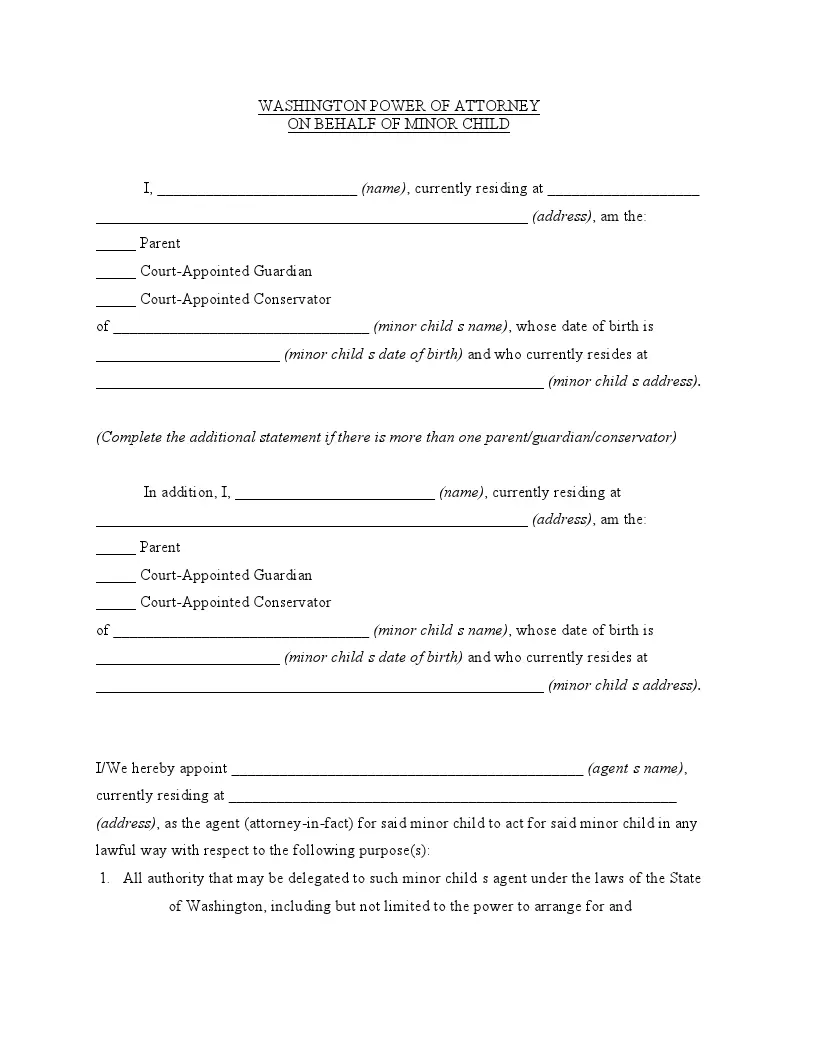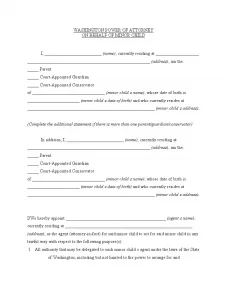Washington Minor Child Power of Attorney Form
The Washington minor child power of attorney allows a parent or guardian to grant another individual the authority to make decisions and take actions regarding the care and welfare of a child. This legal arrangement proves especially beneficial when a parent or guardian cannot look after the child due to health issues, military service, or travel.

Build Your Document
Answer a few simple questions to make your document in minutes
Save and Print
Save progress and finish on any device, download and print anytime
Sign and Use
Your valid, lawyer-approved document is ready
The agent is authorized to make decisions regarding the child or children’s residence, healthcare, travel, education, extracurricular activities, and property. The power of attorney form for a minor child typically contains several elements, such as:
- The names and relationships of the parties involved.
- The specific powers granted.
- The duration of the power of attorney.
- Any special conditions or limitations.
For a power of attorney to be effective, it must be signed and notarized. Additionally, it is not a permanent transfer of parental rights but is limited to a specific period unless renewed.
Using this legal tool, parents can ensure that their child’s needs are met during their absence without court intervention. On the other hand, guardianship, as detailed in RCW 11.130.185 and 11.130.190, involves a court appointment of a guardian for a minor when the parents cannot care for the child, whether due to incapacity, absence, or other reasons.
Washington Minor Child Power of Attorney Form Details
| Document Name | Washington Minor Child Power of Attorney Form |
| Other Name | Washington Temporary Guardianship Form |
| Relevant Laws | Revised Code of Washington, § 11-125-010 – § 11-125-903 |
| Duration | Not Specified |
| Avg. Time to Fill Out | 10 minutes |
| # of Fillable Fields | 44 |
| Available Formats | Adobe PDF |
Filling Out Washington Minor Child POA Form
Filling out the Washington child power of attorney form ensures that an appointed agent has the legal authority to make decisions for a minor.
1. Identify the Principal
Begin by entering your full name and current address. Clearly state your relationship to the child, whether you are the parent, court-appointed guardian, or conservator.
2. Details of the Minor Child
Provide the full name, date of birth, and current residence of the minor child. If there are multiple children or guardians, include separate entries for each.
3. Appointment of the Agent
Specify the name and current residence of the person you appoint as your child’s attorney-in-fact. This person will be granted the authority to make decisions on behalf of the minor.
4. Specify Powers Granted
You can grant full authority, including decisions about medical treatment, education, and overall welfare, or specify limited powers. Delineate the scope of authority if choosing limited powers.
5. Appoint a Successor Attorney-in-Fact
If the primary agent is unable to serve or continue serving, name an alternate person as the successor attorney-in-fact. Include their full name and address.
6. Set the Effective Date
Determine the start and end dates for the power of attorney. This document typically remains effective for a maximum of two years unless extended.
7. Signatures and Notarization
Both you and the appointed agent must sign the document. Include the date of signing. The form must be notarized to verify the identities of the signatories, which involves a notary public or other officer witnessing the signatures. Confirm that granting this power of attorney does not relinquish your parental rights over the minor child.
